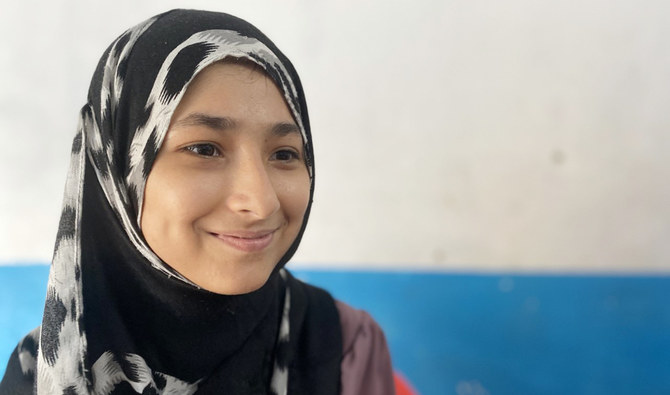KARACHI: When an Afghan refugee boy was one of the top matriculation exam scorers in Mardan, in Khyber Pakhtunkhwa province, last month, Asma Rahimi says she was happy for him, but that the feeling was bittersweet.
It’s because she, too, is a child of Afghan refugees and knows well that she will not be able to complete secondary education in Karachi, where she lives.
“I won’t be able to study further,” the eighth grader told Arab News. “This will be my last year.” Education is a provincial matter, and admission rules differ across Pakistan.
While in Khyber Pakhtunkhwa and Balochistan, which host most of the 1.4 million registered Afghan refugees, children face no legal obstacles in continuing education, in Karachi they have no chance of completing secondary school.
Rahimi’s family moved to Pakistan three decades ago, fleeing armed conflict in Afghanistan’s Kunduz province, which is now dominated by the Taliban.
Her sister studies at Syed Jamaluddin Afghani School, a school for refugees in Karachi’s Al-Asif area, which is registered with the Afghan Ministry of Education and offers tuition up to grade 12. Its certification, however, is not recognized by Pakistan.
“If anyone wants to study further, he or she will have to go to Afghanistan,” Syed Mustafa, the principal of the school, said.
Faced with this situation, Mustafa said, many parents have no other option but to send their kids to religious seminaries for any kind of education.
Rahimi, however, wants to go to university and become a psychologist. Instead of joining the refugee school, she enrolled in Alama Iqbal Public School in Karachi, only to realize that despite a lack of official restrictions, a ban is effectively in place that prevents her from studying beyond grade eight.
In 2012, the Board of Secondary Education in Karachi (BSEK), which is the authority responsible for the registration of private and government schools in the city, made it mandatory for ninth grade students to possess a Child Registration Certificate, commonly referred to as Form-B, which serves as an identity document for those who are below the age of 18. Refugee children cannot obtain it.
FASTFACT
They are unable to obtain the critical document for admission to secondary school.
According to Prof. Saeeduddin, the chairman of the BSEK, the decision was made at the request of the provincial government. He said that without it, immigrants would be able to get Pakistani nationality based on educational credentials.
“If an immigrant does his exams, he could then say that since he has done his exams from Karachi, he should be granted nationality,” Saeeduddin said.
However, Muhammad Riazuddin, the secretary at the Universities and Boards Department Sindh, said that in the province no regulation barred refugees from studying.
He said Sindh is an inclusive province and “strongly believes in children’s right to education, which is enshrined not only in the UN charters but also in the constitution of Pakistan.”
“The National Alien Registration Authority (NARA) cards give legal immigrants the right to have electricity, gas and water connections, as well as to obtain an education,” he said, adding that the same applies for Afghan refugees who have Proof of Registration (PoR) cards.
While there are no provincial restrictions, those in place in Karachi effectively prevent Afghan children in Sindh from studying because most of the province’s 60,000 Afghan refugee population lives in the city.
“We are not allowed to get an education. I cannot study here,” Zahra Arif, a seventh-grader at Syed Jamaluddin Afghani School, said.
“I want to become an engineer. I will make houses for the poor,” she said, adding that she was born in Pakistan and has never visited her native country.
Unlike her, Rahimi has been to Afghanistan and spent three months there. “Our uncle asked us to stay, but there was no school or college, and everyone was illiterate, so my father took us back as he wants us to study, to change our society,” she said. “I want to study; I want to become something in life.”


























